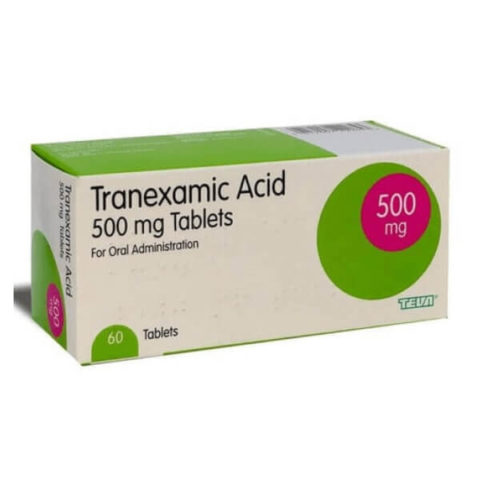
£24.99
Variety of delivery options including next day & free delivery.
Pharmacy, clinic and prescribers based in Greater Manchester.
Start your treatment with a quick and free online consultation.
 This is a prescription product.
This is a prescription product.You need to complete a consultation form and allow our pharmacists to access your NHS records for review before we can issue this treatment.
Variety of delivery options including next day & free delivery.
Pharmacy, clinic and prescribers based in Greater Manchester.
Start your treatment with a quick and free online consultation.
Fill in a quick online consultation for our licensed pharmacists to review.
Our pharmacists will review your treatment to ensure it’s suitable.
Your treatment will be delivered to your door quickly & discreetly.
| Attribute | Details |
|---|---|
| Medication Name | Tranexamic Acid Tablets |
| Type and Form of Medicine | Oral Tablets |
| What it Does | Reduces heavy menstrual bleeding |
| Active Ingredients | Tranexamic Acid |
| Strength | 500 mg |
| Size | 30 tablets per pack |
| Patient Information Leaflet | Link to Patient Information Leaflet |
Tranexamic Acid Tablets contain the active ingredient tranexamic acid, which helps reduce heavy menstrual bleeding. These tablets come in a 500 mg strength and are available in packs of 30. Tranexamic acid works by helping your blood to clot, which reduces the amount of bleeding during your period.
Tranexamic Acid Tablets are primarily used to treat heavy menstrual bleeding. They help reduce the amount of blood loss during your period, making it more manageable. Doctors may also prescribe Tranexamic Acid Tablets for other conditions that involve excessive bleeding, such as nosebleeds, bleeding after surgery, or bleeding disorders like haemophilia.
Tranexamic acid works by inhibiting the breakdown of blood clots. It blocks an enzyme called plasmin, which dissolves clots. By preventing the breakdown of clots, tranexamic acid helps reduce the amount of bleeding. This action is particularly useful during heavy menstrual periods, as it helps maintain the clots that form in the uterus lining, reducing overall blood loss.
Tranexamic Acid Tablets are suitable for women who experience heavy menstrual bleeding and are looking for a way to manage it. However, these tablets may not be suitable for everyone. You should not take Tranexamic Acid Tablets if you:
Always consult your doctor or pharmacist before starting any new medication to ensure it is safe for you.
Take Tranexamic Acid Tablets three times a day, spaced evenly throughout the day. Do not take more than six tablets in a 24-hour period.
Use Tranexamic Acid Tablets for up to four days during each menstrual cycle. If your bleeding does not improve or worsens, consult your doctor.
Like all medications, Tranexamic Acid Tablets can cause side effects. Below are some common, uncommon, and serious side effects you may experience.
For a full list of side effects, please refer to the Patient Information Leaflet.
Active Ingredients: Tranexamic Acid
Other ingredients: The tablets also contain microcrystalline cellulose, povidone, magnesium stearate, and colloidal anhydrous silica. These ingredients help form the tablet and ensure its stability and effectiveness.
EXCELLENT
Page content authored by Dr Hussain Ahmad, last reviewed by Amjad Khan on 11th January 2025.







